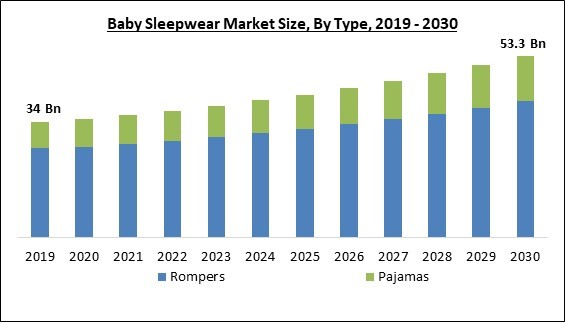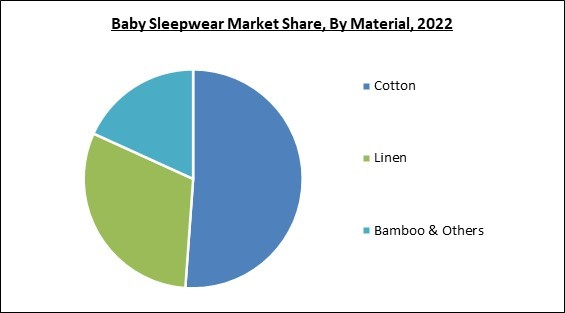People prefer shopping from online channels because of the convenience and busy schedules. Thereby, the online channels would register approximately 1/5thshare of the market by 2029. All over the world, the number of smartphone users is growing as the internet's penetration rises. The e-commerce industry is anticipated to benefit from implementing 4G and 5G connectivity technologies. In the past few years, online purchasing has expanded exponentially throughout the globe. The Census Bureau of the Department of Commerce announced that the estimated U.S. retail e-commerce sales for the first quarter of 2023, adjusted for seasonal variation but not for pricing changes, were $272.6 billion, a 3.0% (0.7%) increase from the fourth quarter of 2022. Expectations for the first quarter of 2023 retail sales totalled $1,799.5 billion, an increase of 0.9% (0.4%) over the fourth quarter of 2022.
Furthermore, Germany has one of Europe's greatest e-commerce sectors. In 2021, total sales reached USD 127.5 billion, a 24 percent increase over 2020. According to estimations, Germany's internet population will rise from 62.4 million in 2020 to 68.4 million in 2025. Additionally, India's eCommerce sector received US$ 15 billion in PE/VC investments in 2021, a 5,4-fold increase from the previous year. This is the highest investment value for any sector in India's history. People are more likely to shop online as the e-commerce industry expands, which is further expected to provide growth opportunities for the market. Some of the factors impacting the market are greater emphasis on fashionable apparel, increasing impact of social media on customer preferences, and growing trend of renting and leasing baby clothing.
The demand for fancy babywear has increased as a result of new parents' interest on fashionable cloth wear and apparel. Furthermore, kids' fashion trends are growing because parents are getting more aware today through the internet regarding latest fashion for kids across the globe. As a result of this, the rise in female workforce is likely to encourage market expansion. Social media is one of the most powerful platforms and a significant factor in expanding new trends in toddler apparel. Every social media platform has extensive active users which are growing even further, and its focus on visual content makes it ideal for product marketing. These brand launches and other social media platforms have contributed to expanding the market.
However, Children between the ages of 0 and 36 months undergo rapid development during this time, demanding regular purchases of new garments that fit. Babies of this age typically wear most clothing for two to three months before it becomes too small for future use. As a result, the growth of market would slowdown in the near future.
Price Point Outlook
On the basis of price point, the market is segmented into mass, and premium. In 2022, the mass segment dominated the market with the maximum revenue share. Baby clothing which is bulk manufactured and offered in supermarkets, hypermarkets, and online stores, is an important part of the market. Consumers with moderate to lower incomes are more likely to shop for affordable kids' sleepwear there. The majority of baby sleepwear items are reasonably priced and affordable.Material Outlook
On the basis of material, the market is segmented into cotton, linen, bamboo and others. In 2022, the linen segment projected a prominent revenue share in the market. Linen fabric is both protective and breathable. It is perfect for summer due to its breathability, lightweight, and moisture-wicking properties. The linen sleepwear is durable, easy to maintain, comfortable, breathable, and lightweight, making it a premium fabric. In light of all these benefits, linen is gaining popularity in the market.Distribution Channel Outlook
Based on distribution channel, the market is classified into supermarkets & hypermarkets, specialty stores, brand stores, online channels, and others. The speciality stores segment garnered a significant revenue share in market in 2022. A specialty store can provide superior customer service, detailed product descriptions, and expert recommendations. Specialized retail formats have been created as a result of the constantly developing retail industry, alterations in consumer behaviors, and global improvement in consumer lifestyles. These stores specialize in a particular product category to offer the greatest convenience and value to consumers within that category.Type Outlook
By type, the market is classified into rompers and pajamas. The rompers segment generated the maximum revenue share in the market in 2022. Most baby rompers include leg flaps for simple changing of diapers, which is very beneficial for parents. Moreover, baby rompers are becoming an increasingly popular option for parents because they eliminate the need to maintain two distinct items of clothing while doing laundry and make it simpler to remove dirty clothes from a baby. As a result, consumer preference for baby rompers is increasing, which would support the market growth in this segment.Regional Outlook
Region wise, the market is analysed across North America, Europe, Asia Pacific, and LAMEA. In 2022, the North America region led the market by generating the highest revenue share. North America is more aware of children's welfare, and more money is spent on baby care and wellness products. Meanwhile, the strong presence of global brands such as Under Armour, H&M, and Zara in the region significantly contributes to the growth of the market. Further, the region acquires a significant share because working parents are increasingly concerned about the safety and cleanliness of their children which is also accelerating the growth.The market research report covers the analysis of key stake holders of the market. Key companies profiled in the report include The Gap, Inc., Carter’s, Inc., H&M Group, Industria de Diseno Textil, S.A. (Inditex S.A.), Mothercare PLC, PVH Corporation, The Children’s Place, Inc., Nike, Inc., The Walt Disney Company and Under Armour, Inc.
Scope of the Study
By Price Point
- Mass
- Premium
By Material
- Cotton
- Linen
- Bamboo & Others
By Type
- Rompers
- Pajamas
By Distribution Channel
- Supermarkets & Hypermarkets
- Brand Stores
- Specialty Stores
- Online Channels
- Others
By Geography
- North America
- US
- Canada
- Mexico
- Rest of North America
- Europe
- Germany
- UK
- France
- Russia
- Spain
- Italy
- Rest of Europe
- Asia Pacific
- China
- Japan
- India
- South Korea
- Singapore
- Malaysia
- Rest of Asia Pacific
- LAMEA
- Brazil
- Argentina
- UAE
- Saudi Arabia
- South Africa
- Nigeria
- Rest of LAMEA
Key Market Players
List of Companies Profiled in the Report:
- The Gap, Inc.
- Carter’s, Inc.
- H&M Group
- Industria de Diseno Textil, S.A. (Inditex S.A.)
- Mothercare PLC
- PVH Corporation
- The Children’s Place, Inc.
- Nike, Inc.
- The Walt Disney Company
- Under Armour, Inc.
Unique Offerings
- Exhaustive coverage
- The highest number of Market tables and figures
- Subscription-based model available
- Guaranteed best price
- Assured post sales research support with 10% customization free
Table of Contents
Companies Mentioned
- The Gap, Inc.
- Carter’s, Inc.
- H&M Group
- Industria de Diseno Textil, S.A. (Inditex S.A.)
- Mothercare PLC
- PVH Corporation
- The Children’s Place, Inc.
- Nike, Inc.
- The Walt Disney Company
- Under Armour, Inc.










